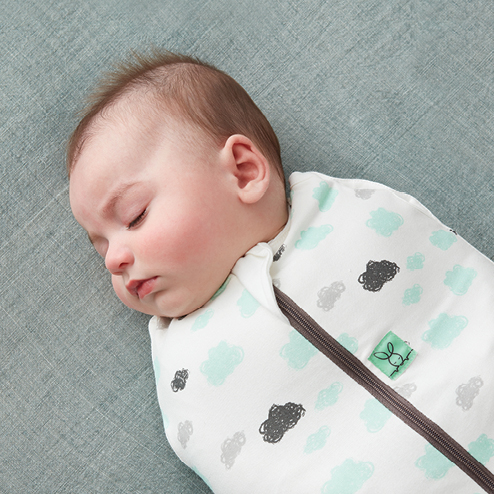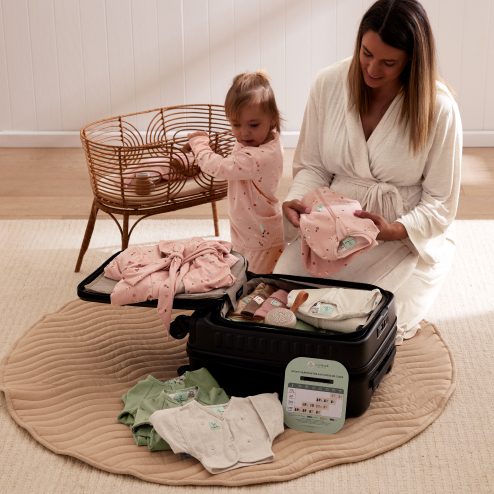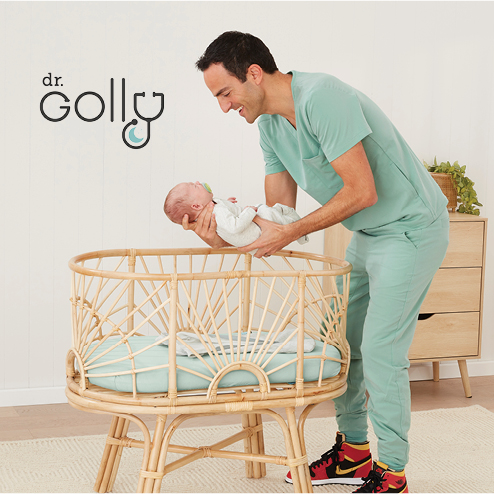The reason there are so many myths is that often information is the result of caring people who have had similar situations and want to share their experiences. Unfortunately, though, not all babies are the same and something that worked for one baby, may not be appropriate for another.
Additionally, the world of baby sleep attracts marketing of ideas and products, and some will promote anything to parents if it makes money. Even if the information is not based on research or entire disciplines of study, they are still offered to parents as a ‘fix’. Sadly this leaves desperate parents being offered information that is either inappropriate for them or their baby. This information is derived from a body of knowledge that specializes in the welfare of infants and their families, aimed at supporting health and wellbeing.
1. MYTH - Babies need to go to bed at 7 pm.
No research states this specifically. Particularly for babies in the first year. In fact, some studies show babies in different countries, go to bed at different times, and they are just fine. Some studies recommend encouraging baby sleep around 6 to 8 pm helps the baby’s daily patterns to align with the sleep hormone, melatonin, release when it begins to influence sleep at around 4-5 months of age.
But saying 7 pm is a must, is just not accurate. Young babies need to sleep when they are tired, and so they may be wide awake at 7 pm, especially in the first few months of life, so there is no sense in trying to make them sleep because that will end in tears for everyone. As their day/night hormones come into play anytime after 4 to 5 months, then you will see your baby become visibly tired in the evenings and need of sleep. It is around this time that a bedtime anywhere around 7 pm will help your baby sleep at the time their hormones are driving their sleep behaviours.
2. MYTH - Never wake a sleeping baby
Healthy babies will wake when they are hungry and will look tired when it is sleep time. Most babies will wake for a feed between 2-4 hours on average. Small babies will need to feed often because they only have tiny stomachs and can only hold a limited volume of milk from each feed. Often babies will feed on an irregular basis, but as they grow in those first 4 months, more of a pattern emerges. It is unlikely you need to wake a healthy baby for feeds.
However not all babies are born full-term or perhaps they have jaundice or have ongoing weight loss or are otherwise unwell and need to be woken to ensure they are getting enough milk to help them back to health. Your health professional will guide you if your baby has additional considerations and need to be woken for feeds. Otherwise, it is fine to leave a baby sleep and let them wake to tell you they are hungry or in need of some emotional comforting.
3. MYTH - Some say babies need silence to sleep, and others say they need to sleep in a noisy environment
What your particular baby needs at sleep time is directly related to your individual baby. Some babies can settle for sleep and remain asleep anywhere, literally. They will sleep in a cot in a silent room and sleep equally well as they sleep in the middle of a house full of visitors and commotion.
There are no studies that specify one or the other for exactly that reason; individual babies respond differently to the world around them, even at sleep time. Most commonly, babies who have been able to sleep well in a noisy environment may begin to struggle to drift to sleep as they become increasingly aware of the world around them.
Classically around 4 months, babies may begin to struggle to block out all the surrounding stimulation at sleep time and may need to be moved to somewhere quieter so they can drift to sleep. However, some newborns struggle to either settle to sleep or stay asleep when there is stimulation around them.
No one rule fits all. Think about yourself, do you nod off at any possible moment, or are you only able to sleep in the sanctuary of your bedroom? Babies differ too, and as their parent, have a think about what type of personality your baby has and look at how they drift to sleep, maybe they may need change to a less stimulating environment, but maybe not. The best advice for you is to watch your baby and be governed by how they respond to sleep time.
4. MYTH - Babies should sleep through the night from an early age
How we ‘wish’ babies would sleep through the night from an early age! Babies need to wake often to feed because their tiny stomachs can only hold enough milk to keep them satisfied for short periods. Also, babies rely on you day and night to help them regulate themselves, so often need you to comfort them.
Remember that most babies are not all skilled as falling back to sleep if they wake with a bubble of wind or something that unsettles them, so they need us often, to help them resettle. Babies who wake and feed often have been studied to show that frequent waking and feeding actually prolongs successful breastfeeding and a range of other benefits.
Another study has shown that babies who often wake overnight in the first months are at a lower risk of what used to be called cot death because of the frequent waking or rousing events. In the early months, babies do not have sufficient levels of the sleep-inducing and sustaining hormone called melatonin, to help them stay asleep for long periods overnight.
So it is not natural or normal to expect babies to sleep all night when young. Often when a baby does sleep for long periods at any time, day or night, then they may have one to two short sleeps after the longer sleep. Keep in mind that every baby is different and will have different sleeping patterns. If you are concerned, before you consider ‘training’ your baby to sleep longer overnight, have a word with your nurse or doctor to be sure you and your baby are supported through this period. Read more: When will my baby sleep through the night?
5. MYTH - Put your baby to bed late at night, so they sleep longer in the morning
This one hardly needs discussing, because if you have tried it, you will well know that this certainly doesn’t work. In fact, you may find that your baby not only wakes in the morning at the normal time, but they may also have a very unsettled night because they have gone off to sleep too late, and their sleep is fractured. The fact is that babies, when they are overtired, can have much more difficulty settling for sleep. Nothing more needs to be said, except, beware of the person who has told you this because they probably haven’t tried it themselves.
6. MYTH - Babies should be able to go to sleep without assistance
Considering babies have spent 9 months sleeping, growing and moving around in a completely different environment. It is no surprise that some babies need more assistance than others to master the art of sleeping outside of the womb. Many factors influence how they drift to sleep, such as the baby’s temperament and experiences.
When your baby is struggling to settle for sleep, keep in mind that the baby is still maturing and developing skills and self-calming is something that is achieved as the baby becomes older. In fact, it is always helpful to keep in mind, when you are expecting your baby to self-soothe, several adults have not mastered this art, so keep your expectations real.
Over time, babies become increasingly able to settle for sleep if they are comforted when distressed and allowed to settle when calm. BUT if a baby becomes overtired, it is harder to calm for sleep, so if you can, avoid situations where your baby becomes overtired because they will definitely need more assistance at this time.
7. MYTH -Babies will only sleep in a snugly, warm environment.
Most babies love to sleep in your arms against your body because they experience similar sensations to what they have already known from being in utero. Over time they become more accustomed to sleeping in their cot or crib. The difficulty lies in the fact that while they were all snug and warm inside of you, they were getting all the oxygen they needed from your blood through their umbilical cord. There was no risk of suffocation from bedding, blankets or bumpers, so they were safe. Once born, the risk of sudden infant death is increased if the sleep environment is not safe.
For that reason, young babies need to sleep on a firm, flat surface while lying on their back. The bedding needs to be well secured, so there is no risk of anything draping over the baby’s face, including soft toys or fluffy under-blankets, and positioners and pillows are definitely not safe to use, no matter how flat. If babies do sleep in a pram, or bouncer of even in your arms or sling, keep an eye on them to be sure they have a nice straight neck, so their soft little airway is not compromised at all. Check also that they are not snuggled into a surface where they are re-breathing the air they have just breathed out. It is lovely to see your baby all snuggled up in that fetal position in your sling or arms, but the safety of it relies on the fact they can get air freely and that their little airway is as straight as possible.
8. MYTH - Swaddle your baby for as long as you like
The clarification for that one should be, you can sleep your baby in a Cocoon Swaddle Sack or Sleep Sack ... where the baby’s arms can be free ... for as long as you like. For safety reasons, babies should have their arms free when they sleep, from the time they can begin to roll. When babies are in sleeping swaddles or wraps, it often helps them settle for and stay asleep when they are young, however as they grow the reflexes that the swaddling helps contain, begin to fade, so they no longer need their arms wrapped in for that reason.
Also, as babies grow, they are more able to comfort themselves by moving around, and again don’t need their arms being tucked in. If you use a swaddle that allows the baby’s arms to be popped out, then the transition is easy.
Just bring out one arm for a few sleep's, then the other. However, if you have been using a material wrap that is a flat piece of material, then you might need to wrap baby with one arm out and keep the rest of the material securely wrapped around your baby. After a few sleep's then only wrap the body securely or remove the wrap altogether. Be sure not to leave materials that are loose or at risk of creating an unsafe sleep environment. Bottom line, for safety reasons, babies need their arms free once they roll according to safe sleeping guidelines.
9. MYTH - It is okay to sleep babies on their side.
The research into sudden infant death resounding about how babies should sleep. Babies who sleep on their side or front are at greater risk of suffocation than those sleeping on their back. If lying on their side, a baby can easily roll onto the undesirable position of being on their stomach. Also, babies have a very soft rib cage, and if laying on one side, the entire body weight is then on one side while the body is trying to inflate the lungs fully with each breath. Sleeping babies on their back are the safest way for a baby to sleep until they can find their own sleep position, which occurs after they begin to roll without assistance. Side and front sleeping positions are just not as safe for babies as sleeping on their back.
10. MYTH - Give a breastfed baby a bottle of formula or adding cereal to a feed to make them sleep longer.
Not only is there no evidence of this being true, but in fact, it may cause the baby digestive discomfort, and then nobody gets to sleep for the night. Babies need to feed frequently to get adequate nutrition, so it is recommended babies be fed when they are hungry rather than offering them something that slows their digestion.
There is also evidence suggesting that anything but milk before 4 months of age can lead to increased risks of obesity in later life. Keep in mind that short-term ‘fixes’ are not always longer-term solutions. Talk with your nurse or doctor if you are having sleep problems before you think about changing the intake of a breastfeeding baby.
A word on myths: If someone tells you to do something and it doesn’t sit well with you, then it is probably not right for your baby. Nobody knows their baby as well as their parents, so if in doubt, consult your gut feeling, even if it is feeling exhausted, it is still an instinct that surpasses all other.
Helen Stevens. Registered Nurse, Midwife and Maternal Child and Family Health Nurse, with qualifications in Infant Mental Health and a range of early childhood interventions. As author, researcher, educator and clinician, she has specialised in infant sleep for over 20 years and has world recognition for her work. Go to www.helenstevens.com.au for more great information and help for parents.





